- Home
- Chris Pourteau
Ironheart (The Serenity Strain Book 2)
Ironheart (The Serenity Strain Book 2) Read online
The Serenity Strain
Ironheart
(Serenity 2.0)
by
Chris Pourteau
Praise for The Serenity Strain: Ironheart
Better than Stephen King. Chris Pourteau writes so well, I’ll read stuff I normally wouldn’t even consider, just because he can pull me in and keep me turning pages, almost the way a vampire summons with his evil charms…. I’m so pulled in, I’m living the story.
—Carol Kean, member of Amazon’s Vine™ Voice program
Great follow up to The Serenity Strain Book 1: Stormbreak. Supernatural powers and evil beings hell-bent on remaking the world on their own terms are no match for a mother’s love and a desire for survival … will leave you wanting more at the end!
—Bridget Y., Amazon reviewer
All woven together, this is a spine-tingling thriller of the first order, filled with apocalyptic action, deep characters, an intriguing plot arc and sensational twists that grip you with each breathless page.
—Chris F., Amazon reviewer
I loved Mr. Pourteau’s Serenity Strain, book one … and with Ironheart, he exceeded my expectations for the followup. Pourteau’s writing is crisp, his character development spot on. From the opening journal entries to the conclusion … I was glued to the page. Very well done!
—Anonymous, Amazon reviewer
Ironheart, the second book in Chris Pourteau’s The Serenity Strain thread of the World of Wyrd, takes all the suspense from the previous work … and doubles it…. A suspenseful, nail-biting addition to Pourteau’s backlist!
—Jonathan F., Amazon reviewer
One of the best components of this story is the introduction of a character from another Wyrd universe. That was unexpected, but the author fit him into the story line seamlessly, and this addition made for a much more complex and interesting plot. Be prepared for an intense and suspenseful read.
—VeggieLover, Amazon reviewer
Amazingly stunning & shocking second part to the former Apocalypse Weird universe! So many nooks ’n’ crannies to this story…. some really evil characters from Chris Pourteau’s book 1 (Serenity Strain) just go and up the ante and there is a tremendous pace to boot.
—Seamus, Amazon reviewer
A great addition to the Wyrd worlds sagas and excellent second in The Serenity Strain. As a family struggles against the forces of evil at the end of the world, hope comes through the mists. Storylines weave together seamlessly and kept this reader twisting in knots.
—Jack B., Amazon reviewer
No doubt about it, Chris Pourteau is one of the best indie writers out there, consistently writing great stories with just the right level of detail. A perfectly-paced tale that pits a handful of strangers, thrown together by fate and supernatural circumstance, stepping up to try to stop a mad man, a demi-goddess and their army, Ironheart delivers on the promise that was found in Stormbreak. Chris deftly develops both the plot and the characters, adding to a story that is hard to stop reading.
—JayD, Amazon reviewer
Text copyright © 2015 by James C. Pourteau and Hip Phoenix Publishing.
First Kindle Edition: May 2016
ISBN 978-0-9899813-9-2
Thank you for purchasing this ebook. It is a work of fiction. Any similarity to real persons, living or dead, is coincidental and not intended by the authors.
No part of this book may be reproduced, or stored in a retrieval system, or transmitted in any form or by any means, electronic, mechanical, photocopying, recording, or otherwise, without express written permission. Permission must be obtained from the individual copyright owner.
ALL RIGHTS RESERVED.
For my fellow writers in the Apocalypse Weirdverse
Keep on truckin’…
Table of Contents
Dedication
Stavros’ Journal: Tuesday, early morning.
Part 1: After the Rain Chapter 1: Monday, evening (the night before).
Chapter 2: Monday, evening.
Chapter 3: Tuesday, morning.
Chapter 4: Tuesday, morning.
Chapter 5: Tuesday, morning.
Chapter 6: Tuesday, morning.
Chapter 7: Tuesday, morning.
Stavros’ Journal: Tuesday, late morning.
Part 2: Across the City Chapter 8: Tuesday, evening.
Chapter 9: Tuesday, night.
Chapter 10: Tuesday, night.
Chapter 11: Tuesday, night.
Chapter 12: Tuesday, night.
Chapter 13: Wednesday, the wee hours.
Chapter 14: Wednesday, early morning.
Stavros’ Journal: Wednesday, early morning.
Part 3: Down the Road Chapter 15: Wednesday, near dawn.
Chapter 16: Wednesday, dawn.
Chapter 17: Wednesday, dawn.
Chapter 18: Wednesday, morning.
Chapter 19: Wednesday, morning.
Chapter 20: Wednesday, morning.
Chapter 21: Wednesday, morning.
Epilogue: Beyond Space, Out of Time.
Acknowledgments
A Word to My Reader
About the Author
Forget your notions of black and white. That goes for hats, too. Strip away civilization and you get chaos, streaked in grays. And in chaos, the only morality you need is living to die another day.
—Old Wisdom
Stavros’ Journal: Tuesday, early morning.
Is this thing on? I hope you can hear me. I’m trying to be quiet and let the others sleep. So, here we go.
It’s only been a day since the roof. Feels a lot longer on the one hand. Shorter on the other. The sun will be up soon, and then our little band of misfits moves. An injured dog, a peace officer who won’t talk, and a teenager who acts like a five-year-old lost in a department store half the time.
I hardly know them. Thrown together, running from Peter and the others. The sinking of the Titanic of the world. That’s what it feels like, anyway.
Okay, I’m getting maudlin. And wasting quiet time, which there hasn’t been enough of. I want to get this audio journal going while they’re asleep and the dog’s semi-alert. It’s funny how you have to actually sit and think about what you want to do with your time when all the distractions of a rat-race life are gone. First World problems in the newest Third World, huh?
What takes up my time now: hours scavenging for food. Jumping at every sound, so my nerves are always on edge. Worrying all the time that Death has come and sniffed me out of my hiding place. Yeah, that keeps me busy.
Like the anorexics last night. The storms hit, what, less than a week ago? Those people looked like they hadn’t eaten in months. Just sitting here writing about them—still makes me shake. So on to something more pleasant.
The stink—God almighty, the smell of this town. Is that what the entire world smells like now? Spoiled milk and meat that’s swollen out of the plastic wrap … flies laying their eggs, and the heat and decay turning them into maggots. The circle of life. Hakuna matata. For the maggots, anyway.
It’s hard to remember what a world without rot and BO smelled like. And what’s worse, we’re getting used to it. Disaster is the great leveler, isn’t it? Now there’s no such thing as First World problems or Third World problems. Now they’re all just End World problems. Finally, one world are we.
Okay, damn it—spiraling down again. Sorry, whoever’s listening to this. But if you are listening to it, maybe wherever you are is better. Hopefully you’re wrinkling your nose and thinking my descriptions of stinking bodies and maggots disgusting. (Hopefully they haven’t made you want to stop listening yet. I’m making this recording for you, whoever you are.)
Because if you are feeling disgusted, that’ll mean you’re in a better place, with sophisticated sensibilities again. Refined tastes and expectations of luxury—like hot showers and electricity and air conditioning. A toilet you can flip a handle and flush. Maybe your food is refrigerated again with no maggots to pick out. Maybe you don’t startle awake with every sound that plinks and pops and cracks, and maybe you’ve never seen a gaunt psycho running down a public street.
A lot can happen in less than a week.
The hurricanes. Two monsters followed by … whatever Ilene was. A storm, yes, but more than that. The anarchy of terrified people fleeing disaster. Jammed together on the roadways, bumper to bumper. Rats clawing over each other to get through the hole of a sinking ship, too stupid to avoid killing one another in their desperation to escape. Now, they’re just like the meat in the markets. Lined up in rows, ballooning in their packages of fiberglass and steel. Maybe some enterprising cynic should take a snapshot of I-45 and put it up on the Internet with some text on top: “Darwin Was Right.”
But there’s no Internet anymore. At least not one that works worth a damn.
And then there’s Peter. He’s the reason I need to record these thoughts. Now that I have a minute, now that we’re pretty sure he’s not hunting us. I want to document what’s going on. Why?
Because this is my fault. All my fault. I created the Serenity virus that caused Peter and the others to go nuts in the wake of the storms. In case you haven’t heard of it—and why would you have, what with being busy surviving the end of the world and all—Serenity was supposed to be a delivery mechanism for a therapy to help curb behaviors that lead to violence and bad decision making. Guess I missed the mark on that one. Seems like a bad joke now. A very bad joke.
So, what to do about it? Well, first things first. Inventory everything I know; everything I see. The empirical approach. Grade school chemistry workbook, right? Titrating the solution in Chem 101. Measuring the volume change in the graduated cylinder after the reaction happens. Cast a theory forth like a witch doctor throwing bones on the ground. Read the bones, or measurements, and decide what they tell you. Cast the bones a second time and recreate the experiment. Compare results and predict the future. If you read the bones the same way twice, you’ve got the makings of a theory for how the thing you’re testing works. Honestly, I’m starting to think scientists are just witch doctors casting bones and recording results. We just do it high-tech.
I know Peter’s therapy was working. All six members of the test group responded positively to the therapy, all except Maggie Spinks. Her resistance is still a mystery. Maybe it’s the key to understanding Peter’s relapse. Now there’s a new idea. I’m rattling my bones with that one.
In Maggie’s case, perhaps her body contained a natural resistance to my synthetic virus and killed it before it could do its work. That would explain the therapy’s failure. If her antibodies killed Serenity before it delivered its payload, the therapy never would’ve taken hold. It’s something that never occurred to me before—that the virus itself wasn’t successful in delivering its payload.
Huh. Rattle-rattle.
But that still doesn’t explain Peter’s relapse: a total failure of the virus empirically proven to have worked, at least for a while. Did his DNA manage to reassert itself? Stranger things have happened. The human genome is, perhaps, the most resilient collection of natural wonders ever conceived.
You know, I used to scoff when students compared human DNA to software. Oh, I understood the inclination. Sure, both are like mathematical equations, their expressions driven by programming that builds stepwise toward a final product. But to compare the cold coding of computer programming with the divine subtlety of DNA…
No, I used to tell my students, if you must associate your understanding of DNA with something, choose music. Music is a mathematical language too, and by writing the equations as musical notes on a bar line, you can understand why certain sounds harmonize together. The notes achieve something on their own, but together, resonance creates more than each individual note can account for. Music—the perfect marriage of science and art—is more than the sum of its parts. It achieves something greater. It touches the soul.
Out of DNA comes who we are, I’d tell them. We’re not cold coding. The underlying principle of programming is predictability. If this is true, then that will happen. Human beings are more than that. We’re nuanced. We resonate to frequencies higher than the sum of our genomic parts. Some of us are nuanced to the point of crazy, which even the psychiatrists define as merely outside the social norm. Modern music in a minor key, as it were. Peter was mentally ill before I met him. Perhaps his particular strain of music simply refuses to be quieted, as Maggie’s refused to be muted at all.
You might think I’m rambling. I’m not. And since you don’t know me, I’ll tell you something.
I used to be a religious person growing up. Catholic, for the record. Mass every Sunday, kneel down, stand up, pray-pray-pray. Then I got interested in science. The natural world, at first; the basics in grade school. Then chemistry and physics. Then I wanted to learn what made us tick.
How the hell did Jesus raise Lazarus from the dead? I mean, assuming it happened at all, right? I’ve wondered about that particular miracle all my life. When I was a Mass achiever, I just accepted it on faith like everyone else. When the science bug bit me, I needed to know how the Lazarus miracle happened. And why.
How do you just restart a dead body? It’s not like cranking a lawn mower, right? I want to know how Jesus did it, so I can figure out how I can do it.
Not restart a dead body—you can lower your eyebrow. I’m not insane. But learning how the human body works—how it makes its music and how I can enhance the resonance of those frequencies to achieve something greater—that’s my need to know.
Then again, maybe that’s my problem. I’m just one little player in the middle of the trumpet section wanting to direct the whole orchestra. One witch doctor casting bones and writing down what he sees, thinking he understands what the bones say because the observable world is predictable—at least, according to science it is. I used to think—I think—that I could be God’s hand. That I could learn to raise Lazarus, if I studied hard enough … if I learned enough. If I could just understand how the symphony worked.
Lately, I feel more like God’s middle finger.
So that’s why I’m recording these thoughts. I fucked it up. Now I need to fix it.
More later.
Eamon Stavros, Ph.D.
Part 1
After the Rain
Chapter 1: Monday, evening (the night before).
“Did you hear that?”
Lauryn ignored Stavros. Lying on her side and turned away from him, it was easy to do. He’d cried wolf too many times already in the last twenty-four hours.
They’d hidden in the washateria all day. Refusing to move. Hardly breathing. Waiting for Marsten and his minions to come and find them, to pull them out kicking and screaming. Waited like that, the whole of Monday. Exhausted and unable to sleep, except for Megan. She’d sobbed quietly for her father for a while before finally collapsing into a restless slumber. And now night was coming.
“I said—”
“Be quiet,” said Lauryn. Her voice a whisper, her tone annoyed.
The breeze picked up outside. Trying to be quiet, Lauryn sat up slowly, remembering oddly at that moment the couch springs in Mark’s apartment. The time he’d hissed at her—not so very long ago, though it seemed like forever—afraid she’d given them away to the home invaders. Mouth and Cackler.
Thinking of Mark made Lauryn’s stomach ache. The pain inside drew her eyes to Megan, who slept with one arm wrapped protectively around Jasper. It hadn’t taken much probing or yelping from him to tell Lauryn the dog’s ribs were severely bruised but not broken.
The wind whistled outside, drawing her back to the present. Then she heard something else—the sound of slapping f
eet.
Stavros tapped the floor lightly to get her attention, then gestured toward the front of the laundromat.
Lauryn raised her eyebrows. Maybe there’s a wolf after all.
Stavros pulled out his 9-millimeter pistol.
Motioning to the sleeping forms, Lauryn indicated he should watch over Megan and Jasper. She palmed Mark’s .40-caliber—hers now, she corrected herself with a twinge—and got to her knees. Keeping low behind the wall of washing machines, she slowly stood up.
She brought up the pistol, focusing her aim on the washateria’s entrance. The glass of the laundromat’s front door was missing. Anyone passing by could simply look inside and see their curious circle of washers and dryers arranged like wagons on a western prairie.
Lauryn advanced cautiously, half-convinced nothing was out there. Stavros’s jumpiness had worried and wearied her all day, his paranoia waking her more than once. They were both on edge, both still recovering from what happened on the rooftop. Every shadow was an enemy. Every sound, a warning.
But no, this wasn’t the wind. Lauryn had heard it, too—reluctant to admit it, wanting simply to ignore it, but knowing she couldn’t. She glanced at Jasper, who woofed once without stirring. As if to say, You take this one.
With her gun pointed at the ground in front of her, she approached the open glass and angled her body to see into the street. Dusk played tricks on her eyes. A low haze left over from the wet heat of the day hung in the air.
Lauryn scanned the street outside. The warm summer breeze brushed signs and streamers—pre-end-of-the-world ads and window dressing—which smacked and clattered against the sides of buildings. Those sounds were so commonplace, so much the background noise of present-day Cataclysmia, that the slap of plastic and wood seemed to tick off the world’s remaining seconds like the second hand on a doomsday clock.

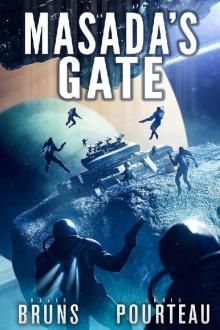 Masada's Gate
Masada's Gate Valhalla Station
Valhalla Station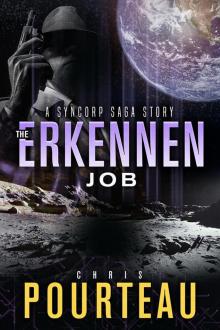 The Erkennen Job
The Erkennen Job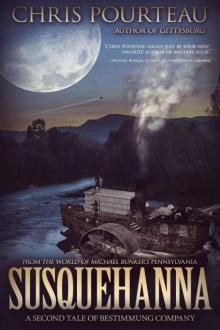 Susquehanna
Susquehanna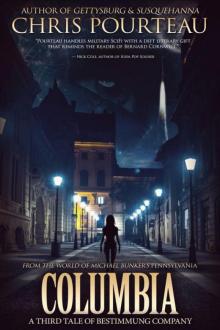 Columbia
Columbia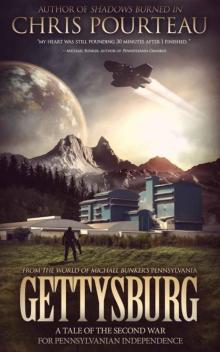 Gettysburg: A Tale of the Second War for Pennsylvanian Independence
Gettysburg: A Tale of the Second War for Pennsylvanian Independence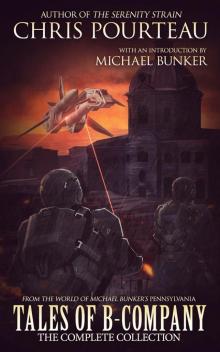 Tales of B-Company: The Complete Collection
Tales of B-Company: The Complete Collection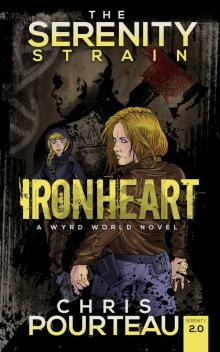 Ironheart (The Serenity Strain Book 2)
Ironheart (The Serenity Strain Book 2)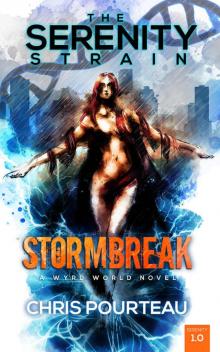 Stormbreak (The Serenity Strain Book 1)
Stormbreak (The Serenity Strain Book 1)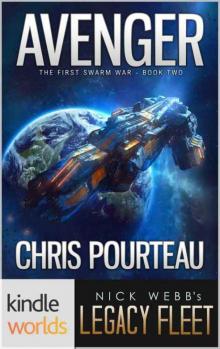 Legacy Fleet: Avenger (Kindle Worlds) (The First Swarm War Book 2)
Legacy Fleet: Avenger (Kindle Worlds) (The First Swarm War Book 2) Shadows Burned In
Shadows Burned In